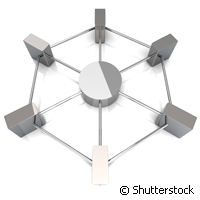EU project to tackle semantic interoperability issues in cloud platforms
EU-funded researchers have kick-started an innovative project that aims to resolve semantic interoperability issues currently impacting cloud platforms and introduce a user-centric approach for applications that are built upon and deployed using cloud resources. The CLOUD4SOA ('A cloud interoperability framework and platform for user-centric, semantically enhanced service-oriented applications design, deployment and distributed execution) project is funded under the 'Information and communication technologies' (ICT) Theme of the Seventh Framework Programme (FP7) to the tune of EUR 2.74 million. Coordinated by the Spain-based information technology (IT) services provider Atos Origin, the CLOUD4SOA consortium seeks to consolidate three fundamental and complementary computing paradigms: cloud computing, service-oriented architectures (SOA) and lightweight semantics. This combination will offer a reference architecture and use of fully operational prototypes. Interest and activity in cloud computing has swelled in recent years, particularly as industry players have identified the benefits that emerge from this innovative technology. For example, a business model to cut capital expenditure, a 'pay-as-you-go' service model, storage solutions and dynamic provisioning are just some of the benefits that result from cloud computing. Despite the advances, however, there are some risks involved with cloud computing. With users spending more time in their hosting services and environment, cloud vendors will feel pressure to guarantee interoperability with parallel and competing platforms. Experts say a compromise between vendor-distinct innovation and user-friendly standardisation will be required in the future, permitting movement of application and data between providers. Cloud standardisation may be in the early stages, but ensuring interoperability between vendors' platforms will in effect help boost competition in a market that targets users in particular. The CLOUD4SOA consortium, consisting of academia and industry experts from Germany, Spain, Greece, the Netherlands, Ireland, Portugal and Romania, will perform a comprehensive analysis to identify and assess semantic interoperability issues that emerge with the cloud. This activity will result in a 'Cloud Semantic Interoperability Framework', which will create user-focused flexible platforms. The partners say they will develop the project's 'Reference Architecture' to sort out any semantic interoperability problems that materialise, providing a generic architecture for a semantically interoperable cloud. The consortium will introduce, deploy and assess the architecture's usability, applicability and adaptability via a proof-of-concept platform that will be used in various scenarios and setups in industrial and businesses showcases in Europe. CLOUD4SOA will also work with small and medium-sized enterprises (SMEs) active in the European cloud market to provide both a solid framework and platform, helping sustain the project's relevance in a market that is advancing quickly.
Countries
Germany, Greece, Spain, Ireland, Netherlands, Portugal, Romania



